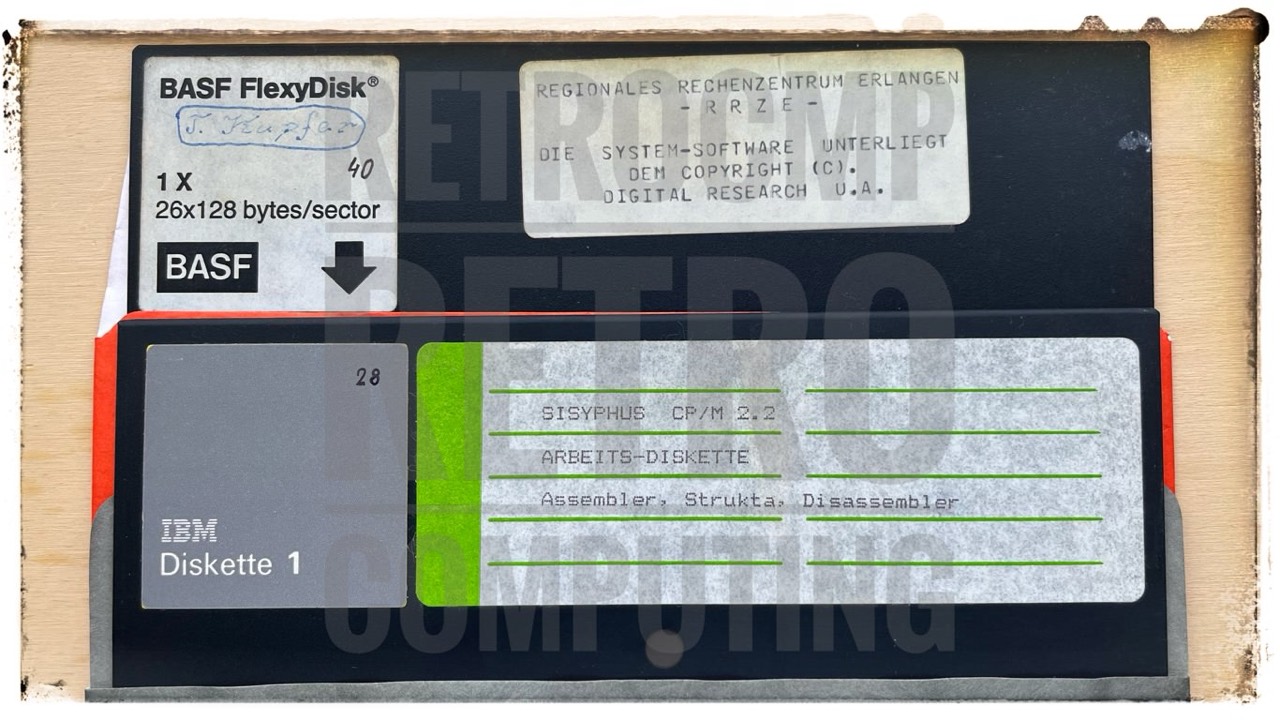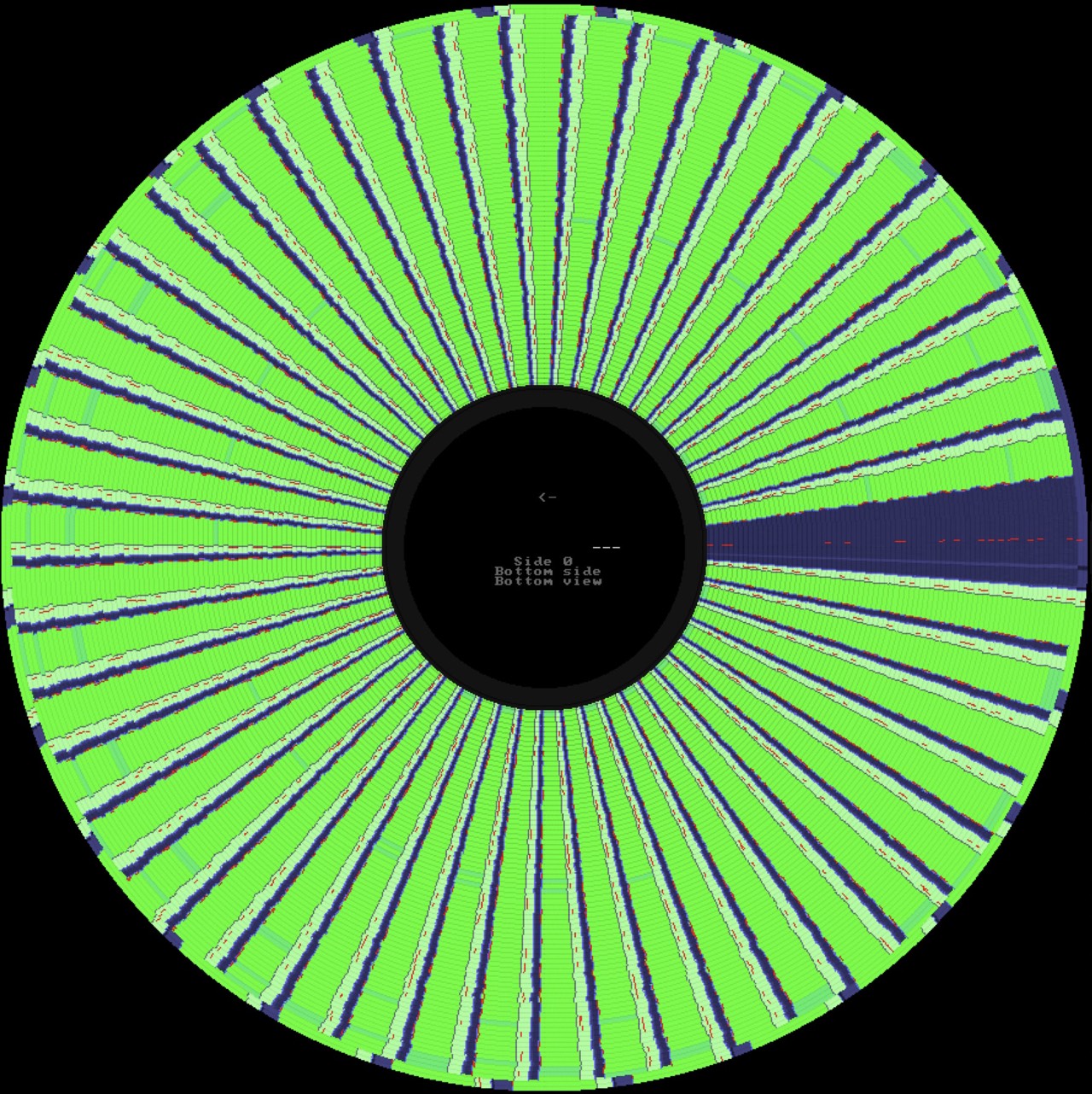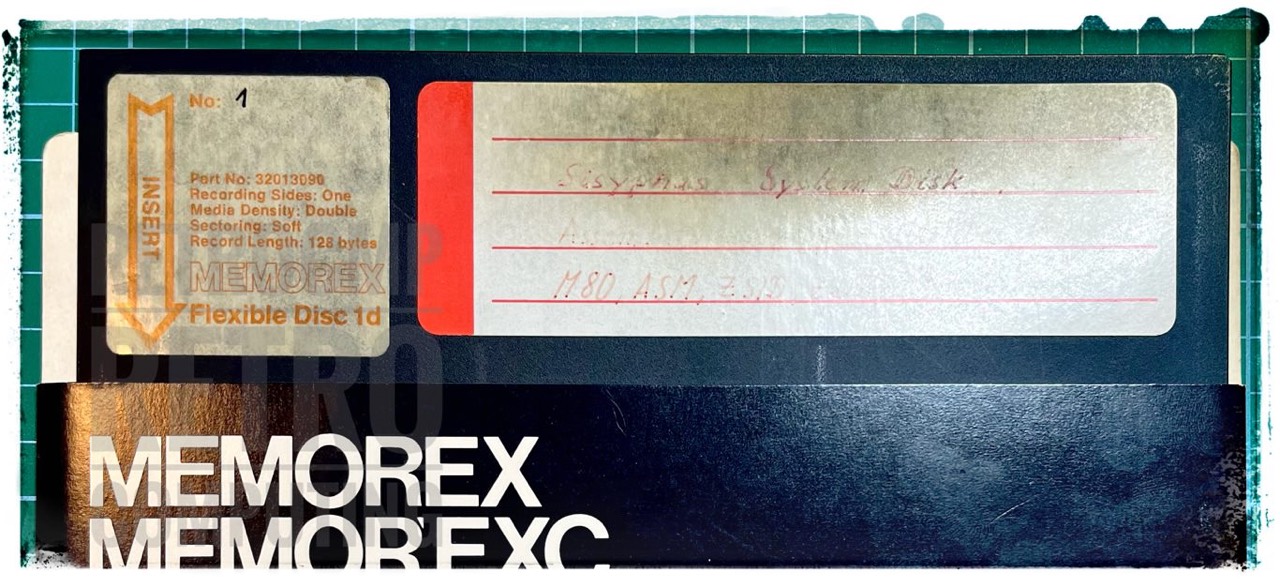SISYPHUS CP/M 2.2
Last revision of this page: March 4, 2025

A few years ago I bought a whole stack of 8" floppy disks (about 80) on eBay US for very little money. The inscription on the labels was in German. So I thought, let's see what's on there. And here is the result.

Due to the inscription 26x128, my assumption was that it has the standard CP/M format (SSSD). But far from it. A check with IMD (by Dave Dunfield) and ANADISK (Sydex) gave further information about the disk.
- cyl 0:
- single-density (FM)
- 26 sec, 128 bytes/sec
- sec order: 1,2,3,4,5,6,7,8,9, ... 26
- interleave 1:1
- cyl 1:
- single-density (FM)
- 26 sec, 128 bytes/sec
- sec order: 1,2,3,4,5,6,7,8,9, ... 26
- interleave 1:1
- cyl 2:
- double-density (MFM)
- 48 sec, 128 bytes/sec
- sec order: 1,17,33,2,18,34,3,19,35,4,20,36,...
- interleave 3:1
- cyl 2 to 48:
- double-density (MFM)
- 48 sec, 128 bytes/sec
- sec order: 1,25,2,26,3,27,4,28,...
- interleave 2:1
Next I read out the diskette with FLUXTEEN/FLUXCOPY, converted it into the Kryoflux format and opened the files with the HxCFloppyEmulator software.

PAW quickly adapted its FLUXCOPY program. It is now possible to read out the first two tracks as FM and the remaining ones as MFM and write them immediately as an image into one raw (bin) file. This file can then be further processed with the cpmtools or the CP/M Image File Explorer (CIFE). The cpmtools are of course more versatile.

In the following you will find the information for the cpmtools and 22DISK definition files. The 22DISK parameters are made by Chuck Guzis (for me) because here a special feature had to be taken into account (EXM).
As I [Chuck Guzis] noted, it's pretty unusual to find a block size of 2048 bytes with DSM < 256 and EXM 0, as it leaves half the allocation block fields in the extent unused. That's why I had to make a real disk and check it out. Whether or not it was intended in the original or was simply an error, is anyone's guess. FWIW [for whomever is wondering], EXM is the extent search mask that CP/M BDOS uses to find the "next extent" in a file. It's a negative mask, so that EXM 0 says to look at all bits in the extent field, while EXM 1 says to ignore the low-order bit.
Sometimes, this was done to ensure compatibility with an older CP/M 1.4 program that did its own random I/O and depends on assuming that any on-disk extent is 128 records (16KB). So, when you move to double-sided 8" media, each block number takes 16 bits and you still get the 128 record disk extents. [1]
# cpmtools
diskdef sis1
seclen 128
tracks 77
sectrk 48
blocksize 2048
maxdir 128
skew 1
offset 6656
boottrk 0
os 2.2
end
# 22DISK
BEGIN SIS1 Sisyphus - SSDD 8"
DENSITY MFM,HIGH
CYLINDERS 77 SIDES 1 SECTORS 48,128
SIDE1 0 1,2,3,4,5,6,7,8,9,10,11,12,13,14,15,16,17,18,19,20,21,22,23,24,
25,26,27,28,29,30,31,32,33,34,35,36,37,38,39,40,41,42,43,44,45,46,47,48
BSH 4 BLM 15 EXM 0 DSM 224 DRM 127 AL0 0C0H AL1 0 OFS 2
END
Name Bytes Recs Attr
------------ ------ ------ ----
C .COM 16K 120
CAT .COM 4K 32 RS
CBIOS-D .SYS 6K 36 S
CIO-D .SYS 2K 4 RS
CLOAD-D .SYS 2K 16 RS
COPY .COM 2K 16
CPM60 .COM 10K 68
D .COM 4K 20
DCOPYALL.COM 2K 14 RS
DCOPYSYS.COM 2K 14 RS
DDTZ .COM 12K 96
DISKTEST.COM 6K 40
DUU .COM 8K 54
ELCH .GRA 2K 14
EPROM .COM 10K 70
EVE .COM 10K 80
FORMAT .COM 4K 19 RS
G .COM 6K 40
HIST .UTL 2K 10
KINSTALL.COM 2K 12
KOPIER .COM 8K 50
L80 .COM 12K 84
LD80 .COM 18K 135
LIB .COM 8K 56
LINK .COM 16K 123
M80 .COM 20K 157
MAC .COM 12K 92
MODEB0 .COM 2K 4 RS
PIP .COM 8K 58 RS
PLINK .COM 16K 126
PRINT .COM 4K 31
REFORM3 .COM 4K 30
REZ .COM 8K 54
RMAC .COM 14K 106
SETUP .COM 4K 18 RS
SH .COM 12K 92 RS
SHOW .COM 2K 4
SID .COM 8K 62
STAT .COM 6K 42 RS
SUB .COM 4K 23
SYSGEN .COM 2K 8
TRACE .UTL 2K 10
WM .COM 10K 80 RS
XDIR .COM 4K 25 RS
XREF .COM 16K 121
XSUB .COM 2K 6 RS
ZDT .COM 6K 48
47 Files occupying 340K, 118K Free.
Information
- ...